M WAQAR..... "A man's ethical behavior should be based effectually on sympathy, education, and social ties; no religious basis is necessary.Man would indeed be in a poor way if he had to be restrained by fear of punishment and hope of reward after death." --Albert Einstein !!! NEWS,ARTICLES,EDITORIALS,MUSIC... Ze chi pe mayeen yum da agha pukhtunistan de.....(Liberal,Progressive,Secular World.)''Secularism is not against religion; it is the message of humanity.'' تل ده وی پثتونستآن
Sunday, May 18, 2014
China: Xinjiang terrorists have multinational roots
China, as a rising power, today faces an unprecedented threat from terrorism. The terrorist threat in Asia, originating in the anti-Soviet multinational, mainly Afghan, mujahideen campaign (1979-89), has its genesis in the Middle East. The center of gravity of international terrorism shifted from the Bekaa Valley in Lebanon to Pakistan and Afghanistan after the Soviet invasion of Afghanistan in December 1979.
Since then, the single largest concentration of threats has oscillates between the Afghanistan-Pakistan border and Afghanistan and Pakistan countries bordering China. Although the threat is global, the most sustained threat is to Asia.
In addition to India, Pakistan and Afghanistan that suffer a large number of fatalities and injuries from insurgency and terrorism, China faces an increasing threat from the Turkestan Islamic Party (TIP), an Al Qaeda-associated group.
Operating from North Waziristan from tribal Pakistan, TIP directs and instigates attacks in Xinjiang and beyond. A car crash in Tiananmen Square on October 28, 2013, killed the three occupants of the vehicle and two bystanders, and injured 38 others.
Similarly, knife-wielding assailants killed 33 civilians and injured at least 140 at the Kunming railway station in Southwest China's Yunnan Province on March 1, 2014.
And on the last day of Chinese President Xi Jinping's visit to Xinjiang, two suicide bombers and knife wielding assassins attacked a train station in China's western city of Urumqi, killing three and injuring 79 on April 30.
TIP claimed responsibility for a series of attacks. Calling the Urumqi attack an expensive offer to the Chinese government, an online Uyghur-language video by TIP's Islam Awazi Media Center requested China reconsider its "cruel" policies.
Xi remarked late April that "The Kashi region is the front line in anti-terrorism and maintaining social stability" when he visited Xinjiang. Although belatedly, China has recognized the threat from Afghanistan and Pakistan, but after Uyghur militants had established a presence in tribal Pakistan and spread its influence.
With the deepening influence of Al Qaeda on TIP, the Uyghur militancy transformed from an ethnopolitical to a politico-religious movement where they recruit irrespective of ethnicity. TIP's Sheikh Abu Dhar 'Azzam praised in a released video the acts of foreign fighters and calls upon Muslims to support them.
Reflecting collaboration with other Turkic groups, the East Turkestan Islamic Movement changed its name by dropping the "East." Working with other groups, TIP has mounted operations in the Afghanistan-Pakistan theater and also adopted Al Qaeda-style suicide attacks.
The idea of attacking iconic targets as well as the strategy of attacking the center was reflected when TIP hit Beijing and other targets outside Xinjiang. In addition to establishing Awazi Media Center, a copycat of Al Qaeda's multi-media unit, TIP demonstrated the growing influence of Al Qaeda on the group when TIP leaders appeared on video just as Al Qaeda leaders have done.
The looming threat to China with the drawdown of US-led coalition forces from Afghanistan is apparent. The threat of insurgency and terrorism is likely to peak in Afghanistan and Pakistan, a theater that borders China. With a failed global strategy to stabilize Afghanistan, with the NATO drawdown from Afghanistan starting 2014, terrorism is likely to take a new dimension.
To stabilize Afghanistan and Pakistan, China should strengthen cooperation with the US, as well as its allies and friends. Superpower and regional geopolitics imperatives affect genuine cooperation, whether through the military or law enforcement, to fight the threat of terrorism and insurgency.


No comments:
Post a Comment